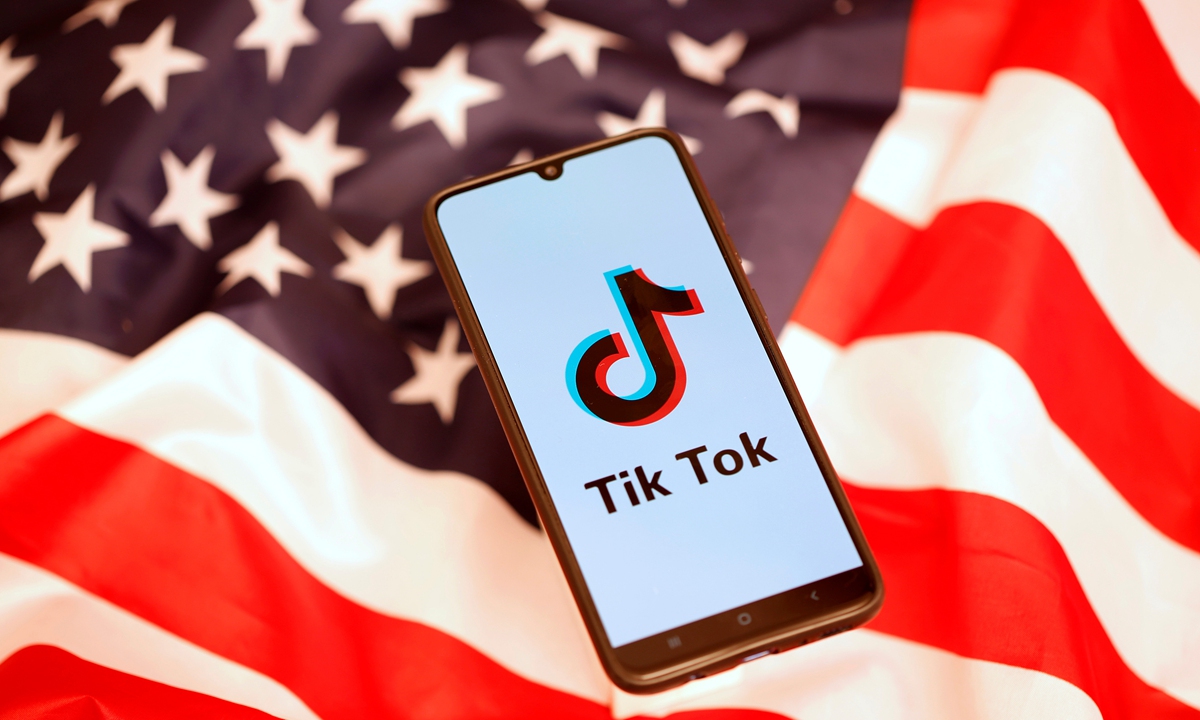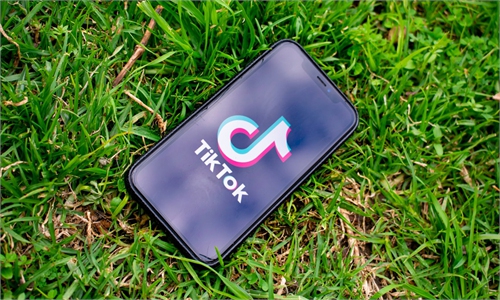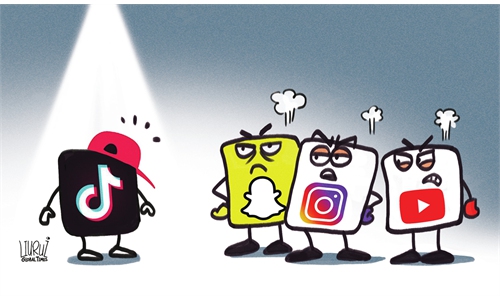SOURCE / MARKETS
TikTok ban extension of US economic, political assaults
App influencers ‘saddened’ by Trump’s potential decision

The logo of TikTok application is seen on a screen in this picture illustration taken February 21, 2019. Photo: VCG
Following a string of acts against Chinese companies ranging from Huawei to those listed on US stock exchanges, the Trump administration is now targeting TikTok, the short-form video app owned by a Beijing-based tech company, saying that they would ban its operations in the US.
The move, which Chinese experts say reflects the US' desperate crackdown on Chinese tech giants by using whatever excuse they can find, is nevertheless triggering outrage and panic among US users who have become quite addicted to the app.
US President Donald Trump said on Friday that he would sign an executive order as soon as Saturday to ban TikTok in the US, claiming that the video-sharing app under its Chinese parent company, the Beijing-based ByteDance, would pose a national security risk to the US because of the personal data it handles.
The US company Microsoft is reported to be in discussions regarding the acquisition of TikTok's US operations while the Trump administration weighs on curtailing the app, but the acquisition deal was not supported by the Trump government.
"We're not going anywhere", Vanessa Pappas, general director of TikTok US, said in a video posted on twitter on Saturday, as uncertainties loom over the app's future.
TikTok didn't reply to an interview request from the Global Times as of press time. Microsoft also refused to comment.
TikTok is also facing intensifying scrutiny in Canberra, with intelligence agencies putting the app under the microscope and some MPs pressing the Federal Government to ban it, ABC news reported.
Triggering protests
The pending ban is fueling opposition and sadness among many users, who used methods from live streaming to posting videos in tribute to what they feared was the end of the app that they grew to love. Some TikTok celebrities also asked followers to continue to support them on other social media platforms such as YouTube and Instagram, according to media reports.
Users of the app gave a 4.7 out of 5 rating for TikTok on the app's review page, and protested the US government's upcoming decision to ban it. One TikTok user wrote that Tiktok is like a family. "I will always cherish Tiktok for being something that's like the most supportive bestie you've never had. It can really touch your heart and I will be almost at the point of crying when it's taken down," the user wrote.
Clayton Boylan, an American student at George Washington University, also noted that the app is very popular in the US which even enjoys some advantages over the products of the US tech juggernaut.
"I think it's hugely popular in America. I mean, even when I'm talking with friends over Facebook, they still send me videos made on TikTok," Boylan told the Global Times on Sunday.
"My general impression is that it's an app designed to keep people entertained and in touch with each other. People voice all sorts of opinions on there and it helps people from different countries and cultural backgrounds interact, which is positive," Boylan said.
Wang Peng, an assistant professor at the Renmin University of China, said that TikTok's popularity among US users, particularly the younger generation, is causing alarm among US politicians about potential challenges it might pose to American tech giants.
"The US government wants to maintain the dominance of local tech companies, particularly on the content side, as they look at the popularity of TikTok as a sort of Chinese blow to the US information and technology industries," Wang told the Global Times.
According to statistics released by the US website statista.com, TikTok had approximately 37.2 million users in the US in 2019, making it one of the fastest-growing social media apps in the country. About 30 percent of TikTok's active users are teenagers.
The website also estimated that TikTok's users could burgeon to 45.4 million by the end of 2020.
According to media reports, some American users of TikTok began searching for a solution to circumvent the ban, even by using a Virtual Private Network.
Hurting the US economy

Photo: CFP
Experts noted that the ban, which the Trump administration claimed was for national security reasons, represented US protectionism and political attacks against China."It's possible that TikTok will face devastating results in the US, being a Chinese company, it has fallen into the whirlpool of China-US friction," Tang Dajie, a research fellow at Wuhan University, told the Global Times on Sunday.
Wang of Renmin University said that Washington's ban on TikTok is another step of a series of US assaults on the Chinese economy as the Trump administration tried to play up to his large number of populist voters.
"The Trump administration is trying to distract American people from internal contradictions, compounded by a coronavirus-triggered economic slowdown, by stirring up hostility against China and making an enemy of the latter," Wang told the Global Times.
Tang also said that the Trump administration is giving a "fatal punch" to TikTok by exerting extreme pressure on the company, just like how it treated Huawei and ZTE.
Besides, TikTok was also used by many people as a platform to protest against the US president's policies. In June, TikTok users trolled Trump's campaign rally in Tulsa by pre-booking tickets and not showing up. According to a Time report, thousands of TikTok users recently flooded Trump's 2020 campaign app with negative reviews.
But experts noted that the US government's ban on TikTok would actually hurt the interests of the US economy and local people by not only taking away a key social and entertainment hub from them but cutting a source of income for many of them.
In a video that was pushed to all TikTok users in the US, Vanessa Pappas, general director of TikTok US, said that the company has about 1,500 US staff, and that it will offer another ten thousand jobs in the US over the next few years.
"What the Trump government does may cause many people in the US to lose their jobs or 'flexible income'. It will further hurt the US economy at a time when it's already vulnerable," Wang said.
More cautious investment
Experts also suggested that Chinese companies should be more cautious when making future overseas investment plans.
"They should take into consideration the potential and long-term political frictions between China and the country they eye to invest in. Also looking for local partners is a better option than investing alone," Wang said.
Tang said that if TikTok opts out of the US market, it would hurt the company's valuations, but ByteDance should have contingency plans for such risks and the adverse global environment won't stop its business boom in the Chinese market.





